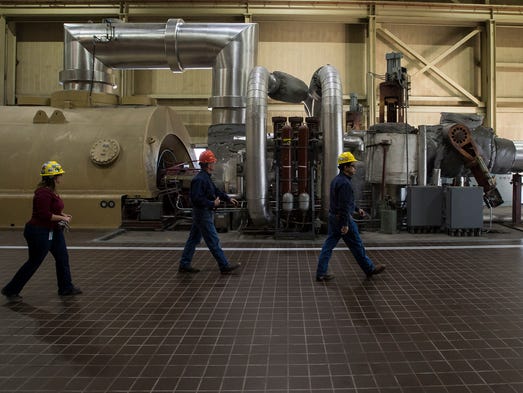More than 30 businesses want to take on Platte River Power Authority’s latest solar power project.
That’s about triple the offers received for the similar Rawhide Flats Solar project back in 2015. Leaders of the electricity provider for Fort Collins, Loveland, Estes Park and Longmont say the avalanche of offers was no surprise — even as the solar industry deals with the fallout of a recently imposed tariff on imported solar panels.
“The solar industry has been growing by leaps and bounds,” said Brad Decker, Platte River’s strategic planning manager. “The technology is advancing and costs are declining. There’s a clear change that’s taking place, and it’s moving pretty quickly.”
Paired with a 150-megawatt wind farm in the works, Platte River’s new solar project is expected to bring the electricity provider to about 50 percent renewable energy. The solar project will go online sometime in 2020.
Platte River gets about 67 percent of its electricity from coal but plans to close its coal plant by 2037. The power provider’s leaders have previously discussed shutting Rawhide Unit One’s doors as early as 2030.
Electricity providers seeking to expand their renewable portfolios generally put out a request for proposals from the private sector, which can take advantage of renewable energy tax credits and sell electricity back to utilities. Platte River asked companies to submit plans for a 20 megawatt solar project with 1 to 5 MW of battery power, a first for the power provider.
Platte River leaders have a flexible vision for the project. It could be located exclusively at the Rawhide facility north of Wellington or have additional off-site components. It could deviate from the requested amount of power, which wouldn’t be a first for Platte River. The Roundhouse Renewable Energy project, a 150 MW wind farm slated for completion in late 2020, was born from an RFP for 50 MW of wind.
“We’d be interested in power coming from anywhere,” Decker said. “Our main focus is going to be on price and trustworthiness of the counterparty. It could be that we look at these offers and find there’s a real good fit that provides us more capacity than we asked for.”
A recently announced 30 percent tariff on imported solar panels could drive up the project cost, but it’s not yet clear by how much. Industry experts predict the tariff will have a larger influence on commercial and utility-scale projects, where panels can make up 40 to 50 percent of project cost, said Blake Jones, co-founder of Colorado’s Namaste Solar.
But he added that many solar companies stocked up on imported panels in anticipation of the tariff, which could delay economic impacts.
“When those inventories run out, that’s when we’re going to figure out how negatively (the tariff) will affect those market sectors,” he said.
Despite the tariff, Platte River leaders say now is the right time to scoop up solar assets. The price of solar power has plummeted in the last decade as manufacturing technology has progressed, and solar tax credits aren’t expected to expire for a few more years.
Decker also attributed the high interest in solar power to environmental consciousness. On the smaller scale, customers like the city of Fort Collins are calling for expanded renewable resources. On the industry-wide scale, regulatory standards like the Clean Power Plan “jump-started” a transition from fossil fuel power to renewable sources, he said.
Decker considers the solar industry about halfway through its growth phase in terms of cost and technological advancement. Battery storage — the other key component of the new solar project — is still in its first chapter, he said.
“Battery storage across the country is not a resource that has been broadly adopted,” he said. “The cost isn’t as competitive as the industry would like, and the technology is relatively untested.”
Batteries are “the missing link” for America’s path from fossil fuels to renewable power, which isn’t available 24-7, Decker said. Utility-scale battery storage will allow power providers to over-produce electricity and store it for later. Utilities could also use batteries to store cheap power purchases and provide extra capacity in case of emergencies.
The total amount of battery storage in the U.S. is roughly equivalent to one-tenth of a percent of the nation’s electricity capacity, Decker said.
“That gives you an idea of how much batteries are contributing to the power system right now and how far they have to go,” he said. “But there’s a bright future, too, because it’s a direct need.”

